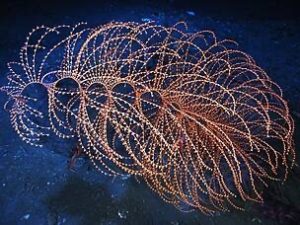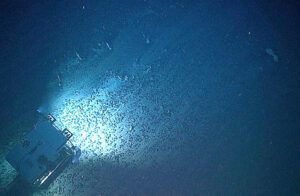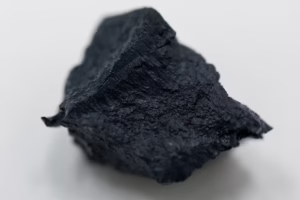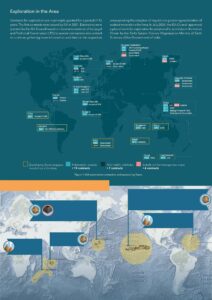International Seabed Authority
US China Race for Rare Earth / Critical Elements
The International Sea Bed Authority (ISA) regulates deep seabed mining in areas beyond national jurisdiction for countries that are parties to the Law of the Sea Convention (LOSC). The U.S. is not a party to the LOSC. Under DSHMRA the U.S. may issue exploration licenses and commercial recovery permits to U.S. companies in areas beyond national jurisdiction, provided all statutory and regulatory requirements are met. The International Seabed Authority (ISA) Assembly of 168 member states assembled in Jamaica to regulate deep-sea mining however the progressive regulatory proposals of Chile, Vanuatu, Palau, France and Costa Rica were unfortunately vetoed and critical ocean environmental issues adjourned by the Assembly . Calls for a precautionary pause or moratorium on deep seabed mining were made by Canada, Brazil, Finland and Portugal. The rationale persists whether protection of the marine environment, precautionary stewardship and deep-sea mining go in tandem. As no consensus emerged the “two year loophole” enters into play.
UN Routine Exhortation
To date 21 countries have advocated a ban, precautionary pause or moratorium on deep seabed extractive mining. On the other hand commercial entities standing for 32% of the global tuna industry recorded their concerns as well as 37 financial institutions overseeing 3.3 trillion euro in assets highlighted potential risks. The UN Commissioner on Human Rights in a routine manner exhorted the participating states against unregulated deep-sea mining. A conservative scientific view prevailing is that around 1% of the material and data needed to draft science-based regulations exists.
Policy Lead for WWF
The ocean is already under severe stress from multiple pressures including overfishing, pollution and climate change and a conservative view is that deep seabed mining may enhance environmental pressure . The present day emphasis should be on restoring the ocean as a functioning ocean ecosystem and adaptation instrument to mitigate the impact of climate change. Kaja Lønne Fjærtoft , the Policy Lead for WWF’s No Deep Seabed Mining Initiative , has termed the ocean as the foundation for all life on this planet .
World Wild Fund No Deep Seabed Mining Initiative

Iridigorgia deep sea coral
© Image courtesy of Aquapix and Expedition to the Deep Slope 2007
WWF and Green Transition
The WWF’s mission is to stop the degradation of the Earth’s natural environment and to build a future in which humans live in harmony with nature by conserving the world’s biological diversity through ensuring that the use of renewable natural resources is sustainable. A WWF commissioned report reveals that the demand for minerals can be reduced by 58 % by resorting to technological choices, recycling and circular economy measures such as product-life extension and materials recovery. The European Academies Science Advisory Council endorses the viewpoint that deep seabed mining is is not a prerequisite for green transition .
Rare Earth Elements/Minerals Race in Seabed
Deep seabed mining is the extraction of critical mineral resources from the ocean floor , beyond a depth of 100 meters. The deep seabed contains valuable mineral resources like manganese, nickel, cobalt, copper and rare earth elements used in defense systems and batteries , smartphones , electric vehicles (EVs), renewables and green technologies, drone fin and satellite navigation and medical devices. Access to these minerals is a key factor in the resilience of U.S. supply chains. The term “critical metal” refers to staple metals that are essential to advanced manufacturing, green technologies and advanced or AI based industries. As demand for rare/critical metals is increasing and land-based mineral deposits are being depleted, seafloor resources are envisaged as the next frontier for mineral exploration and extraction. Marine mineral deposits with a great resource potential for transition, rare and critical metals include mainly deep-sea mineral deposits, known as polymetallic sulfides, polymetallic nodules, cobalt-rich crusts, phosphorites and rare earth element-rich muds. Seabed mining is said to be valued at US $20 trillion , presently a non authenticated figure .
 Credit;National Ocean Service
Credit;National Ocean Service
US based entities may engage in deep seabed mining activities in ocean floor areas beyond national jurisdiction by obtaining prior appropriate government authorizations. The Deep Seabed Hard Mineral Resources Act (DSHMRA) charges NOAA with the responsibility for issuing to U.S. companies licenses for exploration and permits for commercial recovery of polymetallic nodules containing manganese, nickel, cobalt and copper from the deep seabed in areas beyond national jurisdiction. For ocean floor areas within U.S. national jurisdiction, the primary legal authority for offshore mining activities is the Outer Continental Shelf Lands Act , administered by the US Department of Interior’s Bureau of Ocean Energy Management. In April , 2025 the US President issued an Executive Order establishing policies to advance U.S. leadership ” independent of foreign adversary control ” in seabed mineral exploration and responsible commercial recovery. The US remains vulnerable to the critical elements supply chain dynamics.
China versus India
China and India operate under the auspices of the International Seabed Authority and both hold exploration contracts. China is currently the most advanced player globally in deep-sea mining and holds more ISA exploration licenses than any other country. China has deployed specialized research vessels and submersibles and is actively shaping the rules for eventual commercial extraction for securing long-term strategic access to battery and industrial minerals essential to electric vehicles, advanced manufacturing and supply-chain autonomy. China’s early lead in seabed data, mapping and rule-setting could translate into additional leverage in the rare earths domain.
ISA has issued 31 contracts for mineral exploration to 21 firms from 20 countries upto the year 2024 . ISA has entered into 15-year contracts for the exploration for polymetallic nodules (PMN), polymetallic sulphides (PMS) and cobalt-rich ferromanganese crusts (CFC) in the deep seabed with 22 contractors. Commercial mining in international waters has not yet commenced pending the finalisation of an international code for deep-sea mining by the ISA presently countries can pursue deep-sea mining within their own territorial waters or “exclusive economic zones”.Even after the international code is in place, those engaged in deep-sea mining will face major challenges due to high capital requirements and operational costs relative to conventional mining and the enormous technical uncertainties linked to deep sea mining .
India, by contrast, is pursuing deep-sea mining primarily as strategic insurance against Chinese dominance. Its efforts are centered in the Indian Ocean Basin where it has held an ISA contract since 2002. India has 2 contracts awarded by ISA. India’s program reflects a slower, more cautious trajectory shaped by developing technological readiness, environmental concerns and regional priorities.
 Credit;Reuters
Credit;Reuters
Legal Framework
The United Nations Convention on the Law of the Sea (UNCLOS) and the International Seabed Authority (ISA) provide the legal framework for deep seabed mining exploration having significant maritime territorial claims under UNCLOS. Article 137 of UNCLOS prohibits unlawful Deep Seabed Mining. Pakistan is lagging behind in deep seabed mining exploration despite Article 76 of UNCLOS granting Pakistan rights to exercise sovereignty in the maritime territory expanding up to 290,000 sq km.
US Economic Strength Guarantees Seat on ISA
During negotiation of the 1994 Agreement, a permanent seat on the 36-member ISA Council was created for the country “ having the largest economy in terms of gross domestic product ” on the date UNCLOS entered into force.When UNCLOS entered into force on 16 November 1994 the United States had the largest economy. If it ratified UNCLOS the United States would have occupied the only permanent seat on the ISA Council. By not ratifying the US has ceded influence over critical maritime issues to rival commercial powers .
It is estimated that China controls as much as 80 % of global rare earth mine production and around 90 % of the associated refining and processing capacity. China refines 60 % of the world’s lithium supply, controls 80 % of the global cobalt refining capacity bolstered by substantial financial stakes in mines located in other countries from where these rare earth elements are sourced. China also leads global production of other key minerals such as nickel and aluminum consolidating its dominance across critical supply chains.
 Credit;UN News
Credit;UN News
Rare Earth Elements Blue Economy Strategy
The development of a rare earth elements blue economy strategy coupled with an energy transition, digitalization and infrastructure expansion warrants extensive studies for appreciating of environmental impact of deep sea mining. Vulnerable marine areas have to be protected through adopting of advanced technologies for deep-sea mineral exploration and mining, marine spatial planning and having a regulatory framework in place for safe minerals extraction from the seabed .
By Nadir Mumtaz

Blue Economy Trademark (IPO)
Credit ;
http://www.panda.org/news Twitter @WWF_media
https://oceanservice.noaa.gov/deep-seabed-mining/
https://doi.org/10.3390/min9010003
https://news.un.org/en/story/2025/07/1165482
https://www.usgs.gov/centers/pcmsc/science/global-seabed-mineral-resources
https://doi.org/10.58932/MULG0057
https://www.swp-berlin.org/10.18449/2025C34/
https://isa.org.jm/exploration-contracts/polymetallic-nodules/
https://www.adlittle.com/en/insights/viewpoints/seabed-mining-20-trillion-opportunity
https://www.usni.org/magazines/proceedings/2026/january/future-sovereignty-deep-sea

Leave A Comment